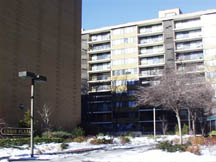A 3.5 percent rent increase may seem relatively small in this booming real estate market, but to the middle-income renters and senior citizens who have lived in the Union Plaza apartment complex for more than two decades, it’s significant. They shared their concerns at a meeting held Feb. 1 to complain to a state agency about the impending increase. “I’ve been in this complex pretty much since it opened,” said 75-year-old Jose Dveso, a retired city employee and 29-year tenant of the building, two weeks ago. “When I first moved in, there were a lot of middle-income families who started out here. But now that some of us are retired and on fixed incomes, it’s getting harder to pay the increases in rent.” The meeting, held by the Union Plaza Tenant Association with the mayor and state agents, was attended by more than 70 tenants, many of them elderly. The complex is a non-subsidized privately-owned building for middle-income families. When it was built in 1969, it got a low-interest mortgage from the state Housing and Mortgage Finance Agency in return for keeping its rents low. The building still falls under the same guidelines, but it also can have moderate increases that are subject to the approval of the Agency. Since the building’s owners, Denholtz Associates, proposed a 4.9 percent hike for the building last year, tenants have complained. The Finance Agency, in response, decided to raise the rents only 3.5 percent as of March 1. But some residents were not appeased. “I can’t understand how they continue to raise the rent so much when they know so many of the elderly who live here are struggling,” said Hilda Otero, 75, who has been living at the complex for 20 years. “It is a hardship for some of us, even for families. We’re not looking for handouts, but there should be a compromise on how much can be charged.” “We felt that all these figures being given to us were inflated,” said Nora Guajardo, president of the Union Plaza Tenants Association. “The issue wasn’t that we’re fighting to get zero because we knew a rent increase was possible. But higher than the 3 percent issued last year puts a hardship on working families, especially on our elderly seniors who are trying to survive on a fixed income.” The Agency said they felt the increase was fair. “Based on our review and the tenant letters we received, our agency felt that a reduced number of 3.5 percent would meet the needs of what the owners had proposed,” said Anthony Cupano, director of management for the NJHMFA. “We understand that Union Plaza is one of the few buildings in the city that doesn’t received federal assistance, but we also wanted to be fair to the tenants who have come up on these increases and deal with their concerns. With no rent subsidy involved because they are privately-owned buildings, we were trying to be comparable to both sides.” As has been customary in the past few years, the landlord of the 240-unit complex has each year raised the rent a percentage that they felt would contribute to the maintenance and upkeep of the buildings. Frances Fajardo, a member of the building’s maintenance staff, said that in the past three years, the increases have provided new furnances, stoves and refrigerators for each apartment, as well as upgraded parking and playground facilities. “We have a great group of tenants and we are not trying to drive anyone out,” said Steven Denholtz, whose family has owned and managed Union Plaza since 1969. “Even though we weren’t invited to the meeting as in previous years, that doesn’t mean we don’t know their concerns. No one wants to pay an extra $30 on their rent, especially when you’re living on a fixed income. But we need to maintain the upkeep of these buildings and the increases that have been asked of our tenants each year [are] simply to help us run the building more effectively.” Tenants have also asked Mayor and Assemblyman Rudy Garcia to intervene in the past. “It is important that we [exhibit] more caution towards the rent increases being placed on residents in our city,” Garcia said last week. “Our tenants are the backbone of our community and we can’t afford to have them pushed out of their homes because they can’t deal with increases that are above their means. We need to be able to foster a compromise between the landlord and the tenants that will reduced the proposed hike and work with everyone involved to make sure that it’s an amount we all can live with.”
Our Digital Archive from 2000 – 2016
